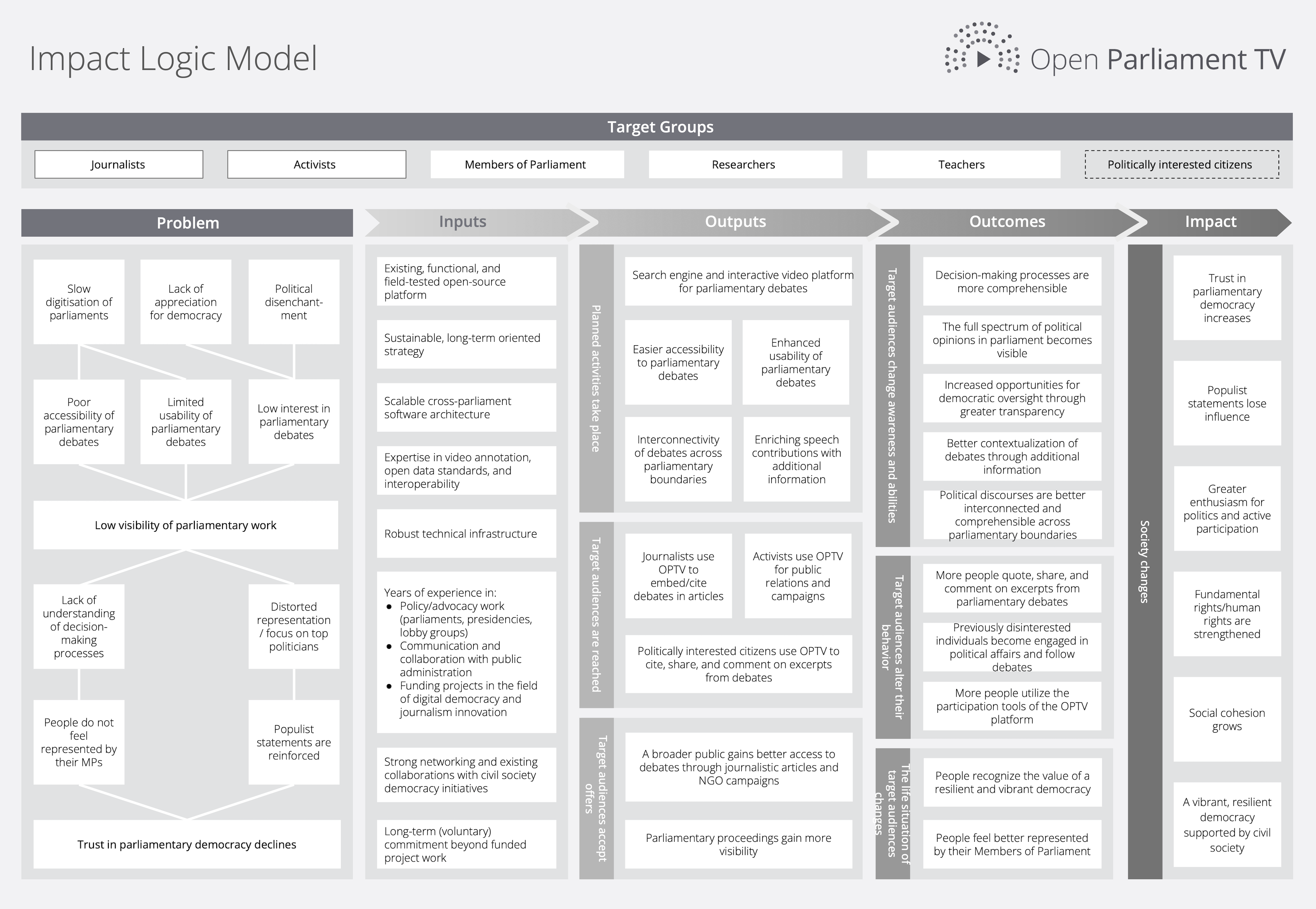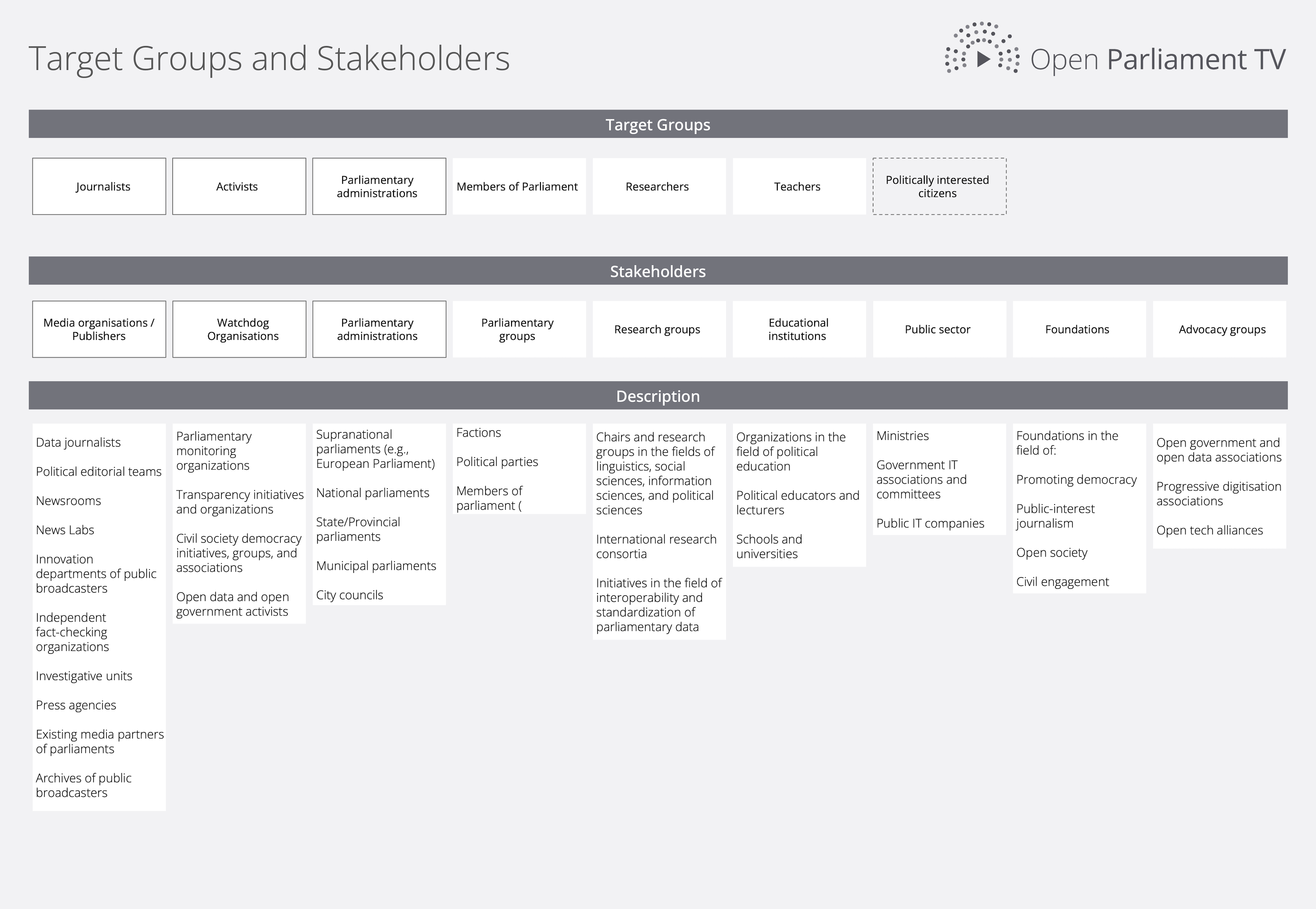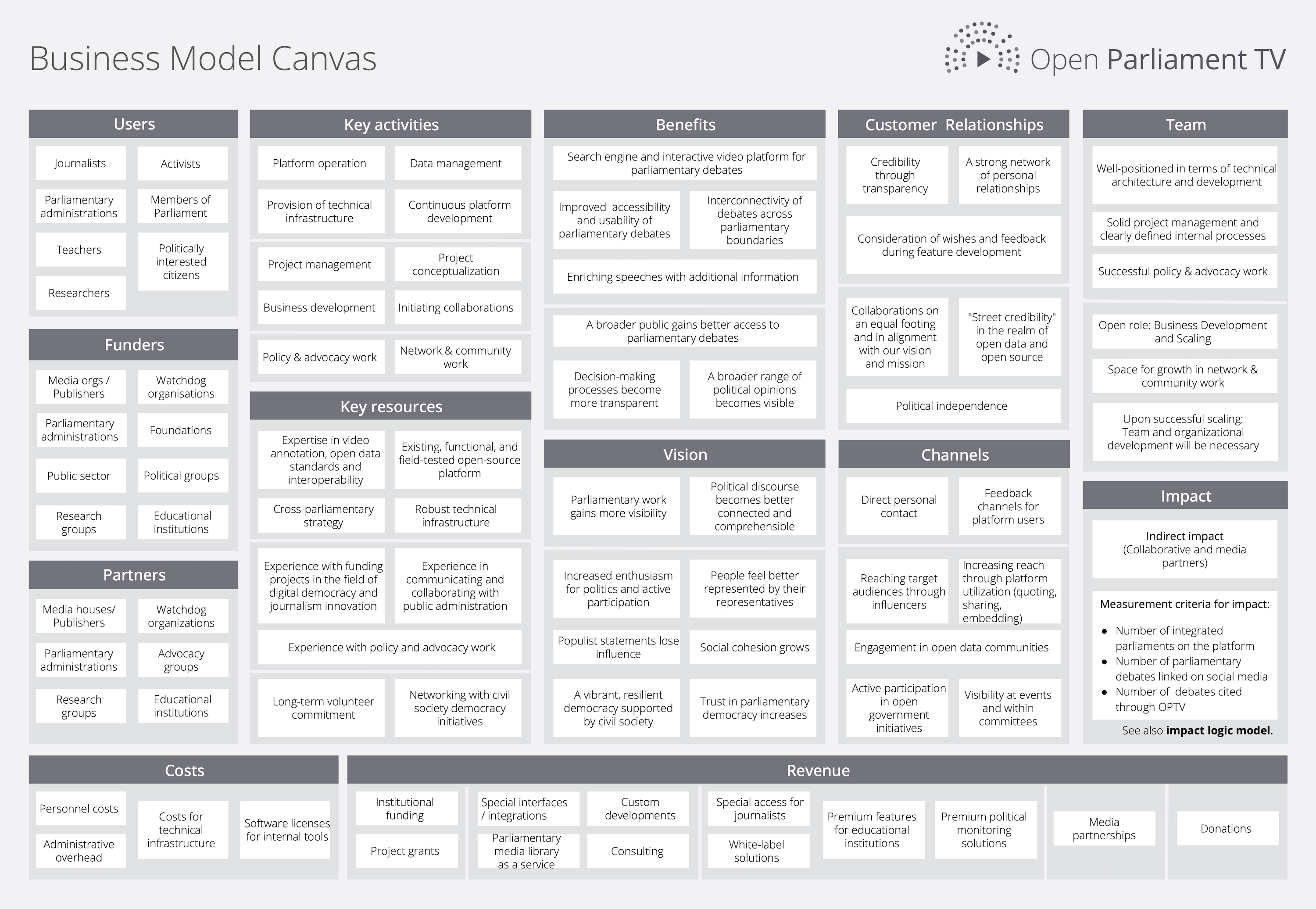How to scale
Open Parliament TV ?
Summary
Open Parliament TV was launched over 5 years ago. We have received broad support from politics, media organisations and civil society, and have been able to implement a solid basis for our search engine and interactive video platform for debates in the German Bundestag.
Over the past 12 months, we have designed an impact logic model and a non-profit business model, , and created a technical architecture that enables transferability to state parliaments, city council meetings, meetings of the EU Parliament and other national parliaments.
With this work we have laid the foundation for scaling and perpetuating the project. However, in order to successfully scale Open Parliament TV, we first need to close gaps in roles and expertise (especially in the area of business development) and build a team that is geared towards the long term. The overriding goal here is to distribute project management over two shoulders on a permanent basis (in the areas of management, business development, project management, scaling, and internationalisation).
To achieve this, we need more planning security than provided by project fundings lasting only 6-12 months. We have therefore extended our planning horizon to a period of 4 years (from the beginning of 2024 to the end of 2027), taking into account external fundraising advice (see also 7. Milestones).
The importance of video content for shaping political opinion is increasing every day due to the rapid growth of platforms such as Instagram, TikTok and YouTube. At the same time, more misinformation is being spread on social media every day and it is becoming easier to generate manipulated content in a matter of seconds. As a consequence, we need easily accessible, re-usable and credible public sources more than ever. The moment for scaling up our work on Open Parliament TV is right now.
1. What is Open Parliament TV?
Open Parliament TV is first and foremost a search engine and interactive video platform for parliamentary debates. The core of our platform is a technical architecture that automatically synchronises the video recordings of the speeches with the official text proceedings.
This allows us to make the videos searchable word by word in a full text search. Via the synchronisation of video recordings and written proceedings, we can additionally provide:
- interactive transcripts (click on a sentence > jump to point of time in the video)
- context-related annotations (additional information on mentioned people, organisations, topics, laws and documents directly in the video player)
- improved means of participation (quoting, embedding and sharing specific video segments in the context of the full speech)
Open Parliament TV significantly simplifies finding, sharing and citing video snippets from parliamentary speeches. Based on single terms or sentence fragments, the relevant video snippets can be found in split seconds, played and then embedded as a quote in other platforms.
Besides the full text search, Open Parliament TV includes additional entry points into the debates, like finding speeches via the profile page of a faction or watching all speeches in which a specific document or law is mentioned.
Open Parliament TV is open source and inter-parliamentary. The entire architecture was designed from the start to be transferable to all parliaments that publish video recordings as well as written proceedings of the sessions.
In October 2021, the German Bundestag became the first parliament to be accessible on Open Parliament TV. More than 60,000 speeches from over 10 years of Bundestag history are now accessible at https://de.openparliament.tv and the number is growing every day.
2. Vision, Mission and Strategy
More on the Vision, Mission and Strategy of Open Parliament TV3. Impact
In order to better integrate democratic processes and means of participation into our digitised everyday lives, they must be easily, promptly and directly accessible to everyone.
In this context, videos of parliamentary debates serve as a tangible, contemporary, and up-to-date interface to the work of parliaments. The recordings and live broadcasts are not just materials for journalists or parliamentary staff, but a direct implementation of the credo "the parliament negotiates in public".
With Open Parliament TV we are strengthening trust in parliamentary democracy by
- making parliamentary debates more accessible and easier to use
- increasing the overall visibility of parliamentary decision processes
Ultimately, our aim is to reach politically interested citizens and the general public. However, since we do not classify content ourselves and the contextualization with additional content is limited to automated procedures, we focus our logic model on the two target groups of journalists and activists (see also 4. Target Groups and Stakeholders). Through analyses, research, background reports, fact-checking formats, and campaigns, they embed the debates in a content context that we, as Open Parliament TV, cannot and do not want to offer.
We see our strength in the development and provision of technological solutions as a "tool" for working with parliamentary content. Our search engine and interactive video platform for parliamentary debates is a building block of a newly created "basic architecture" of digital democracy, which offers independent and inter-parliamentary access to content.
Indirect Impact
Our work has an indirect impact. By journalists and activists using our tools, the parliamentary process as a whole gains more visibility. We are convinced that we can ultimately reach significantly more people in this way and have a much broader and more sustainable impact in line with our logic model. Focusing our work on more clearly defined target groups also makes it easier for us to set clear and measurable (SMART) goals.

4. Target Groups and Stakeholders
Open Parliament TV is primarily a tool for journalists and activists. Indirectly, we want to reach politically interested citizens via these two target groups (see also 3. Impact).
Journalists and activists (specifically: watchdog organisations) classify processes in parliaments, participate in critical analyses and discussions of political positions and put the statements of members of parliament into new contexts.
However, the way videos of speeches in parliament are currently published is largely based upon sharing short key moments with a clear lack of contextual information like a link to the full debate, relevant original documents, or additional materials. This means that video clips are used to share short moments, but as soon as the speeches are used for in-depth analyses, background articles, fact checks, or longform reporting, the textual proceedings are the basis. The main reason for this is that the videos can neither be searched by keywords nor can specific statements be cited or directly linked.
We are making videos of parliamentary debates more usable for journalists by making it easier to find, share, quote and embed video excerpts from parliamentary speeches, enabling the embedding of current reporting in speeches, and offering tools for the statistical evaluation and analysis of parliamentary debates
In the future, political discourse on our search engine and interactive video platform will be linked and digitally accessible across parliamentary, national and linguistic borders in cooperation with parliamentary administrations.
In addition to the primary target groups and stakeholders, political groups, research groups, and educational institutions are important stakeholders due to their ongoing work with parliamentary content.
For example, research groups have been working in international consortia for many years on the issue of interoperability and standardisation of parliamentary content and processes (keyword: machine-readable plenary minutes and legislative procedures).
Through pilot projects and cooperations with educational institutions, we will develop tools and didactic concepts for the manual annotation / linking of speeches with teaching / learning materials. This will improve the usability of parliamentary content in the field of political education.

5. Non-Profit Business Model
The development and implementation of a sustainable business model is a central component of the 4-year scaling phase and will be developed in close cooperation between the project management and the new role to be filled in the area of business development. The ideas described below are therefore a preliminary draft, as is our Business Model Canvas
Principles
In line with our goal of making parliamentary debates more transparent and accessible, all components of the Open Parliament TV platform will be published permanently for everyone under free licences and can be implemented and further developed in a decentralised manner. Our business model follows the principle of political independence, is non-commercial, and is subject to our Code of Conduct.
Financing
In principle, the Open Parliament TV idea can be applied worldwide to all national and regional parliaments that publish video recordings and written proceedings of meetings (our technical architecture was designed for this from the start). Each parliament also increases the number of potential target groups and stakeholders. In addition, the digitisation of governmental processes, legislative transparency, open data, strengthening democracy, and combating misinformation are some of the most important topics of our time.
We see great scaling potential here, both for the expansion of our search engine and interactive video platform, and for the future funding of our work on Open Parliament TV.
Over the past 5 years we have been supported by foundations, democracy funding programs, innovation funding and individual large donations. In the future we plan to finance further development through pilot projects, research projects, and public funding. From 2027, ongoing operations are to be financed in a non-profit business model by institutional users & donors, and until then, by foundations.
Within this framework, we will develop special products and services for specific target groups that follow the classic models for monetising open source projects and are intended to make us financially independent of funding in the long term.
Products
- Plattform services
- Extended export formats (e.g. interface to video production tools)
- Video annotations tool
- Uploading custom materials / additional documents in protected areas and private groups (e.g. for school classes and political seminars)
- White-label solutions
- Parliamentary media library as a service
- Video player and social media snippets with custom branding
- Politics monitoring solutions
- Automated summaries of debates
- Notifications for keywords in new debates
- Notifications when terms accumulate
- Individual statistics and evaluations
We are also considering the launch of a secondary platform, separate from the search engine and interactive video platform for parliamentary debates, which will in particular make the annotation functionalities (linking videos with additional information at specific times) and the synchronisation of videos and transcripts accessible for other domains (e.g. teaching / learning videos, explanatory videos, lecture recordings, news broadcasts and political magazines).
Services
- Custom developments
- Custom interfaces / integrations (e.g. in editorial systems)
- Plug-ins for existing tools / software
- Advice & consulting for parliamentary administrations (open data standards, interoperability, interfaces, document formats)
Furthermore, in cooperation with media partners, we plan joint research and content analysis, fact checks on parliamentary debates, experimental storytelling formats and data visualisations, as well as the development of campaign tools and widgets, before upcoming elections and during important debates.

6. Team and Organisation
In recent years, Open Parliament TV has been supported by a team of 2-5 people - depending on the funding situation - as well as by volunteers.
We are well positioned in the areas of technical architecture and development and have set up solid project management workflows as well as corresponding tools and internal processes in recent years.
However, we have a skills gap in the area of business and product development. As part of the scaling process, we want to close this gap right from the start by filling a new role for business development and thus permanently distributing project management over two shoulders.
With the help of external consulting and coaching, we will invest time in building a solid and long-term team.
Organisationally, we are embedded in the Center for the Cultivation of Technology (CCT) gGmbH, a fiscal and legal host organisation for non-profit open source projects.
The CCT manages donations, income, and employment relationships for us. The CCT has the experience and infrastructure to manage large funds, including EU funding and international cooperations, for example, in the US. In addition, the CCT enables us to use the Cultivation Space in Berlin Wedding as a coworking space and for in-person meetings.
As part of the scaling process, we are planning to establish Open Parliament TV as an independent entity in mid-2025..
7. Milestones
By June 2024:
- Definition of a detailed roadmap and time schedule until the end of 2027
- Appointment of the Business Development role
By October 2024:
- Development of a scaling strategy
- Detailed elaboration of the business model
- Integration of developers into the daily work routine
- Intensive coaching on roles and collaboration (goal: permanent distribution of project management across two shoulders)
By February 2025:
- Development of a strategy for integrating new parliaments
- Sharpening of the target group definition and development of the product vision
Mid 2025:
- Foundation of Open Parliament TV as an independent organisation
(currently administratively under the umbrella of the Center for the Cultivation of Technology gGmbH)
By the end of 2025:
- Prototypical development of first products (see 5. Non-Profit Business Model)
- Testing and evaluation of the products with target groups
By the end of 2026:
- Integration of a German state parliament and an additional national parliament
- Completion of the first market-ready products
From 2027:
- Financing of ongoing operations mainly through institutional users and donors
Version: March 2024